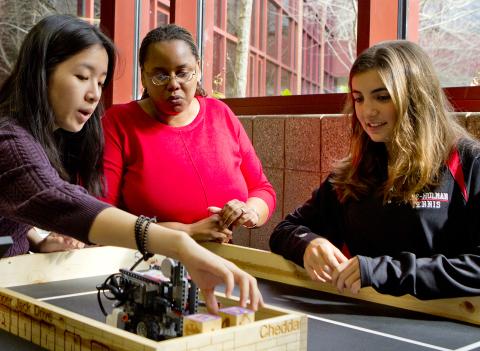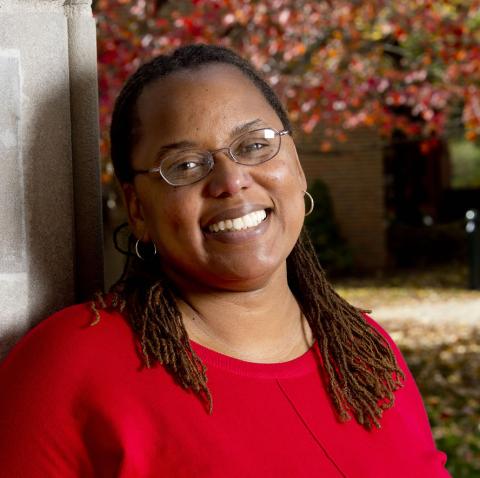Get to know ECE alumna, Dr. Carlotta Berry, associate professor at Rose-Hulman Institute of Technology.
Name: Carlotta A. (Johnson) Berry
GT Degree(s): B.S.E.E.
Year Degree Awarded: December 1993
Current Title/Position: Associate Professor, Electrical and Computer Engineering
Current Company/Organization: Rose-Hulman Institute of Technology
Describe your average workday: Since I am a college professor, there is no average workday, every day is different. There are some things that I do every day such as teach classes, mentor and advise students in academic, personal, and professional development issues and also independent study projects in robotics. I also write papers, proposals and review papers as the editor of the ASEE Computers in Education Journal. In addition, I perform service by participating on committees and directing the robotics minor and Rose Building Undergraduate Diversity Program (ROSE-BUD). Since my school has a special emphasis on undergraduate science and engineering education, it is very student-centered. There are not very many graduate students so it has a much different model for engineering education than Georgia Tech. It is primarily a teaching institution, so the faculty teach all of the courses and the few graduate students that we have are mostly course-based with just a few thesis-based. Some of our graduate students are graders but they did not teach or TA courses or labs. Another unique aspect of my department is that it is very hands on with the majority of the courses also having a lab component. This means that I may teach between 2 and 4 classes a quarter which may be 2 to 3 hours of lecture and 3 hours of lab each.
How did ECE prepare you for your current role? The primary way that I was prepared was that I used my experiences in the engineering classroom at Georgia Tech to frame my teaching philosophy and the way that I instruct my students. It was also my experience at Georgia Tech that inspired me to become an engineering professor. I wanted to see more diversity including women and underrepresented minorities and change the face of the profession to look more like the world that I live in. Before this, I was going to simply be an electrical engineer and my post-retirement job was going to be a high school math teacher. Since I actually teach ECE, Georgia Tech gave me the foundational knowledge that enabled me to pursue graduate degrees in ECE related to controls and robotics.
What advice would you give current ECE students? It is very important to develop a network and community of support. This is particularly important for women and underrepresented minorities because there are still so few in engineering in general but particularly in ECE. The numbers are low in the profession as a whole as well as the academy. Having a network of classmates for both studying socializing was how I made it through Georgia Tech. It is important to also find a mentor who will encourage you on those difficult days and also provide advice and guidance on academics, career and personal advice to help you navigate the curriculum and profession. The mentor can be cross gender or cross cultural but he or she should have an appreciation for diversity and what it takes to be successful in the field and understand the value of unique experiences. Unfortunately, as a student at Georgia Tech I was not able to find a mentor but thankfully, I was able to identify several during my graduate program. It is also very important to have good time management, organization, study, communication, and leadership skills. Engineering is about more than just being good at math and science. It is about having the ability to effectively communicate ideas and sell others on your ideas while also being a role model and leader.
What do you think is the most important technological breakthrough of the past 20 years? This is hard and I would of course be biased. Since my area is robotics, it would be behavior-based robotics in 1986 and how reactive control has changed the way that robotics control systems are designed. Hybrid and feedback controls are topics that I teach in my courses so that students understand the different approaches to implementing AI algorithms on mobile robots to achieve a mission or task. I think that since robotics and in particular Human-Robot Interaction are in their infancy, there is still much to discover to advance the field.
When you aren’t being an electrical/computer engineer, what do you like to do? I love to spend time with family, in particular my husband and daughter, and also cross stitching, knitting, and crocheting.
Is there anything else you would like to add? Since I was a dual degree student at Georgia Tech, my experience may be a little different from many. I attended Spelman College for 3 years and Georgia Tech for 2 years. Most of my foundational courses were completed at Spelman, so my time at Tech was particularly intense because I took all engineering courses in 2 years. I also worked several jobs while a student at Tech including in campus dining and at the Spaghetti Factory, which means I had to have a very high work ethic along with time management and organizational skills. All of this means that the experience was rather challenging so a network was vital and an integral part of the survival strategy.
Additional Images

